An Old Man in a white-and-blue checkered dinner jacket and a pair of round spectacles ambled up the three steps into the bus, both hands wrapped around the cold steel handrails, gluing the bottom of each shoe on the well-trod floor of one step before he dared lift the next, and with his eyes wrinkled fixedly on the climbing operation; while the glass and the panels and the roof of the bus shivered with the idling diesel engine; and while The Driver, his eyes hidden under a black scally cap, watched.
When The Old Man reached the top he gave The Driver a pleasant smile. He fished into a pocket and pulled out a cloth zipper-wallet, from which he drew a handful of change. Having discerned the fare from one of the hieroglyphs plastered on the dash, he counted his money and dropped the exact amount into the till. The other passengers raised their heads at the pinball machine-like sound.
Using the backs of the seats for support The Old Man stepped down the bus. He walked past six other passengers; they had already resumed their own thoughts. He stopped and set himself into one of the empty, rattling, cracked leather benches. The Driver waited for The Old Man to take his seat. Then the bus quivered prodigiously, like a dog shaking fleas, and sprang forward on the street.
The Old Man had sat on the bench directly in front of a Young Man. The pair were not quite at the back of the bus (no one sat at the back of Bus Number 19) but about seventy-five percent of the way down its length. The Young Man had raised his head away from the corner of the bench and the bus wall and watched The Old Man take his seat. The Young Man's head had brown hair, straight, not too long, but lying so flatly against his temples that it seemed painted on, and a sharp chin. His eyes were a crestfallen shade of azure, not saddened by anything in The Old Man, but rather out of habit. The eyes had caught The Old Man's shoes before he sat. They were a pair of mahogany oxfords, not polished, worn to a sandy color at the toes, and with leather-cilia reaching up from the collar and tongue to mingle with a pair of bristly, matching-mahogany wool socks.
The Young Man's blue eyes lingered on the shoes. You can tell a lot about a man by his shoes.
When The Old Man had taken his seat The Young Man sheathed his sharp chin back in the hollow of his palm, and leaned once more against the numbing window glass.
For a time only the quivering of the bus caused any movement in The Young Man. Under half-lids and without expression, he stared through the glass. Beyond, huge grey brushstrokes of fog concealed a city.
The Old Man looked around smilingly. He followed the curve of the roof and spent a little while gazing on the pictures there. These were not advertisement; they were images of flowers, saints, fruits, great seas and arching forests, all hand-painted across the bus ceiling in fresco; like the ceiling of the Sistine Chapel, except that all the human shapes in the art were mildly disproportionate or distorted, as in a Bronzino or an El Greco. The bright small eyes of The Old Man tried to meet those of the other passengers, including the crestfallen blue ones. But the eyes found no warm in that particular group of Bus Number 19’s passengers. So The Old Man turned his head back around, and crossed and uncrossed his legs, and stared at the ceiling mural again.
But then, unable to contain his excitement, The Old Man twisted bodily around on his bench. He snaked an arm - checkered in the blue and white coat - over the bumpy black plastic of the seat backboard. The Old Man craned toward The Young Man, caught his eye, and spoke. His mouth opened a sliver for each word.
The Young Man raised his head again. His whole body emerged from the corner of the seat and the steel wall like a fold-out couch. He fully digested The Old Man's face. It was a genial face, balding as mentioned, with the small eyes behind the even smaller lenses, wrinkled like watered-and-dried paper, a little fleshy about the cheeks and chin, and with the corners of the mouth turned up in the pleasantest of smiles. Altogether a truthfully friendly face, such as is only found in the age extremes; reflected almost inversely in the flatly pale, sharp, unemotive stare of The Young Man.
The Young Man shrugged. He extended a long and slightly bony hand - at the end of a plain, buttoned, white shirt - towards the window and the fog beyond. After a pause he leaned toward the aisle and directed The Old Man's eye down the corridor of benches, to the front where the driver's image was reflected in the rearview mirror. The Young Man opened his mouth and let out a string of quick, economical words.
The Old Man's face puckered into a laugh. He shook his head and waved The Young Man's back from the aisle, as if to spare him the effort of leaning. When The Old Man had finished laughing he resumed speaking. He pantomimed as he spoke. First he pointed at the brushstrokes of fog beyond the window. Then, he brought his hands up to opposite shoulders and rubbed vigorously.
The bus halted. The stop was sudden, every passenger leaning forward at an acute angle. No one stirred. Not at first. This stop looked (because of the fog) exactly like the stop where The Old Man had come aboard. A circle of road and sidewalk spread out around the bus, and the four pairs of motionless rubber wheels cast no shadow in the mire. One lone stick of a sign rose crookedly, like a lightning bolt, up from the pavement. The sign atop it was shaped like a reuleaux triangle, with cryptic, child-like black letters scrawled on its shiny white face.
The windowed folding door opened. The bus driver plucked the box microphone from the dash and positioned it in front of his mouth.
A woman sitting four seats from the front, on the right side of the aisle, slid carefully out of her bench. She was old too, though not as smiling as The Old Man. She stepped with dignity down the three worn stairs and exited. The folding door closed behind her. The bus surged forward into the fog.
The Young Man and The Old Man had watched all this together. All of the passengers had watched. Now The Old Man turned back to The Young Man. He shivered again, nodded to himself, and swept a hand out in the direction of the old woman's stop; as if emphasizing his earlier point about riding alone. The Young Man nodded, though this sympathy didn't extend to his expression. He answered The Old Man.
The Old Man seemed about to say something else. But just then The Young Man drew up from within his skinny chest a primeval sigh. He returned his body to the corner, his eyes to the glass. The Old Man's face flashed between a smile and an apologetic frown. He opened his mouth to speak, thought better of it, started to wave, thought better of it, and finally turned away. He sat upright, set both palms on his knees, and followed The Young Man's gaze out of the window.
Some time passed, not much. The Old Man admired the ceiling for a while. Then he tried catching other passengers' eyes. No fish bit. He searched through the front pockets of his blue-and-white lounge coat. From the left pocket he retrieved the cloth wallet. He pulled back the zipper with the pinch of two fingers and held one small eye wide against the opening. His persistent smile withered slightly. He put the wallet away. Resigned, he looked back at the fog. All the while The Young Man lay perfectly tranquil and undisturbed.
The Old Man sat suddenly more upright (his back had almost none of Time's bending upon it). His eyes expanded to absorb the swathes of fog. He twisted on his bench again and beamed at The Young Man. When the latter didn't respond, the former tapped the bumpy plastic back of the seat. The Young Man's eyes shifted. So did the eyes of his reflection in the window. The Old Man pointed energetically through the window (his arms had absolutely nothing of Time's leadening in them). He spoke hurriedly, glancing between The Young Man and the window.
The Young Man's eyes reeled back to the window. He saw that The Old Man was not blind (at least not with his tiny glasses on) nor fantasizing.
Through the fog of that day, laying heavy on the city and swarming right up to the windows of Bus Number 19, there came a gap of sunlight. The vapor evaporated, in what seemed an almost directed swathe. On the bus's left a view opened onto a little burg. It was a small burg, not quite residential, not quite industrial. It was an old quarter of the city, where the buildings were all crumbling on the outside, crumbling on the inside, but not falling apart or rotten-looking; somehow in a stately state of decrepitude.
The Young Man spotted The Old Man's building easily enough. It was one box in the burg, a big one of about seven floors. A wide green lawn dotted by oak trees and park benches hemmed it on the left and front face; the city street, covered in leaves blown down by the wind, snuggled to its right. A wide stone porch ran along the building's facade, and people in cardigans moved to and fro through a front rotary door.
The Old Man clapped his hands together with childish delight. He pulled down his spectacles and wiped them quickly on the shirt under his coat. He placed them carefully back upon his nose, and opened his mouth for another string of small words.
The Young Man nodded once in his palm, then raised his chin a little to speak.
The pair looked back through the window. The two sets of eyes; the half lidded and crestfallen blue ones, and the grey, small, bespectacled ones; they both followed the track of a grey-white V shape which came swooping from the bright sky. Geese. Nine of them floated down to one of two small ponds in the green beside the library. The Old Man pointed so vigorously that he tapped against the glass. His finger shook.
The Young Man seemed about to say something else. Just then both men lurched forward in their seats. The bus came to another sharp stop in the road. The Young man heard a noise from behind. He turned and saw that one of the windows was open, the window latch having come loose at the sudden halt.
The Young Man rose slowly, like a sprouting tree. From his bench he stepped out into the aisle and walked to the back. The air here was cold. It came in with the fog through the window. He slid the glass back into place, then fixed the latch. The cold current of air ceased instantly, and the HVAC unit in the roof was already blasting away the reaching tendrils of cold.
The Young Man turned back around. The Old Man was no longer sitting on the bench. He had risen and stood already at the steps beside the driver. The Driver hadn't called out on his microphone; The Old Man must have known his stop, just as he claimed.
The Old Man looked back once. He waved. Then, with still greater caution, he made his way back down the same three steps by which he'd boarded Bus Number 19; both hands on the sleek handrails; one faded mahogany oxford dropping down a step and fixing itself firmly to the floor, before the next oxford swooped shakily in beside it. In this way, The Old Man left Bus Number 19. The folding door rolled shut behind him.
The Driver waited in silence. The Young Man loped back to the exact same seat, and folded himself into the corner of the wall and bench in the precise same position, down to the organization of his sharp chin in his palm hollow, and of his left-hand knuckles against his cheek.
The Young Man felt Bus Number 19 rush on. He stared through the window. He stared at the fog, through the dreary glass. Nothing else was there to see. The heavy painted vapor had rolled back in, erasing the library memory which the sun had given The Old Man.
Thank you for reading.
Ready for Part 2?




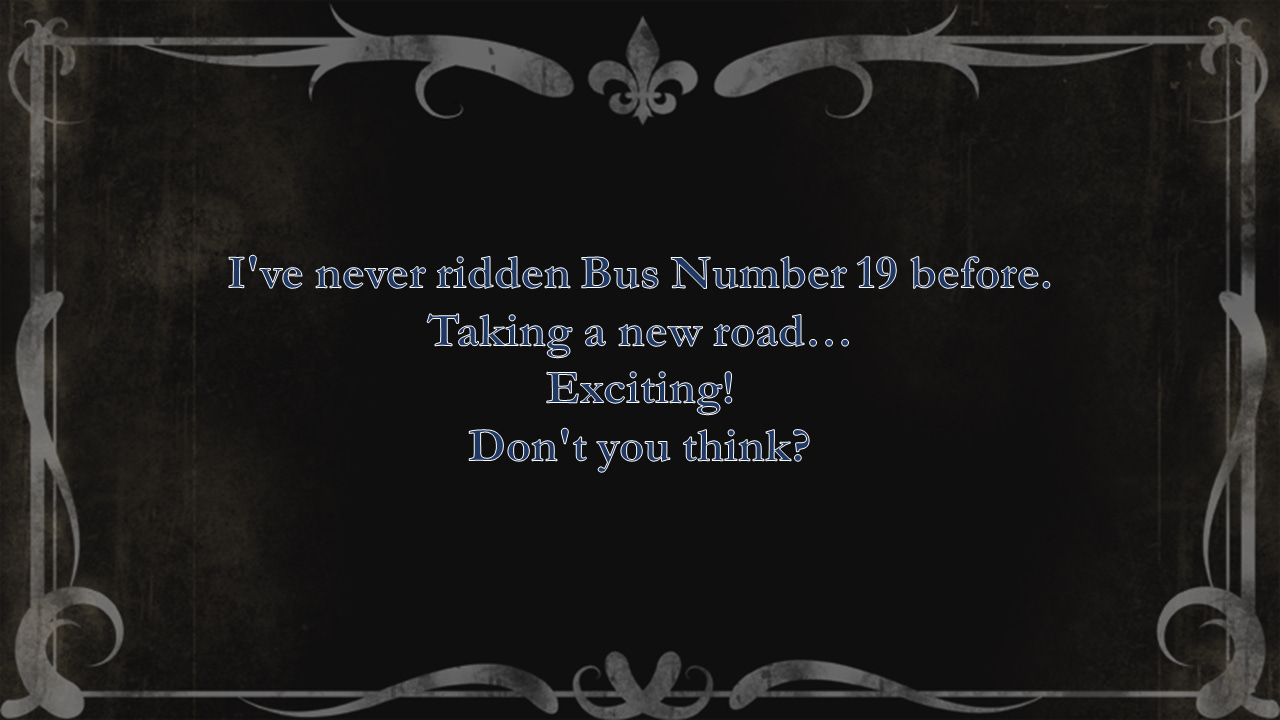
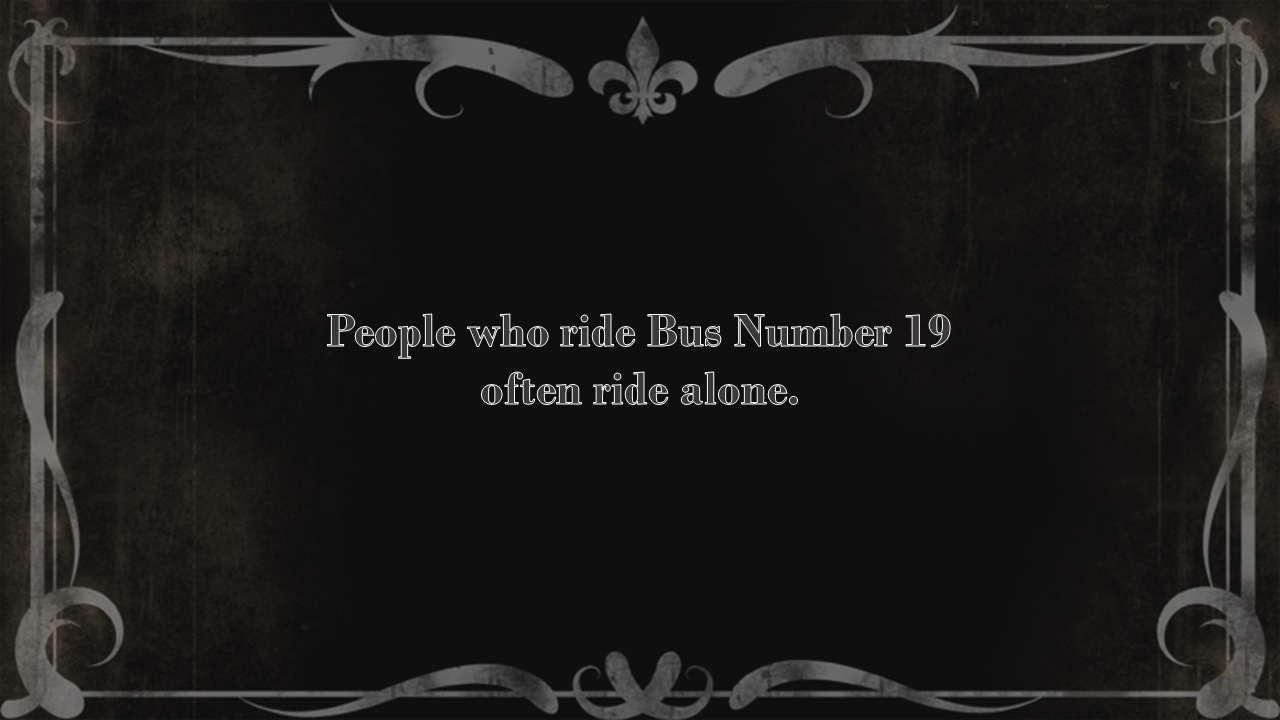
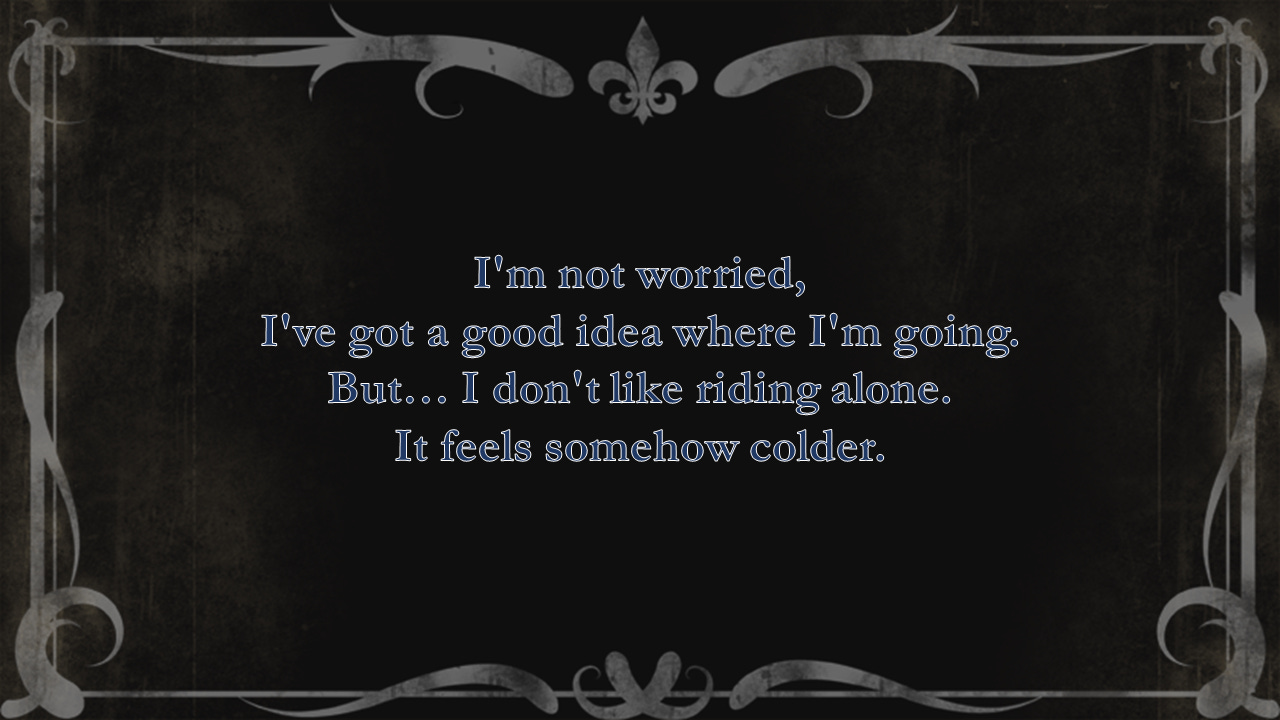
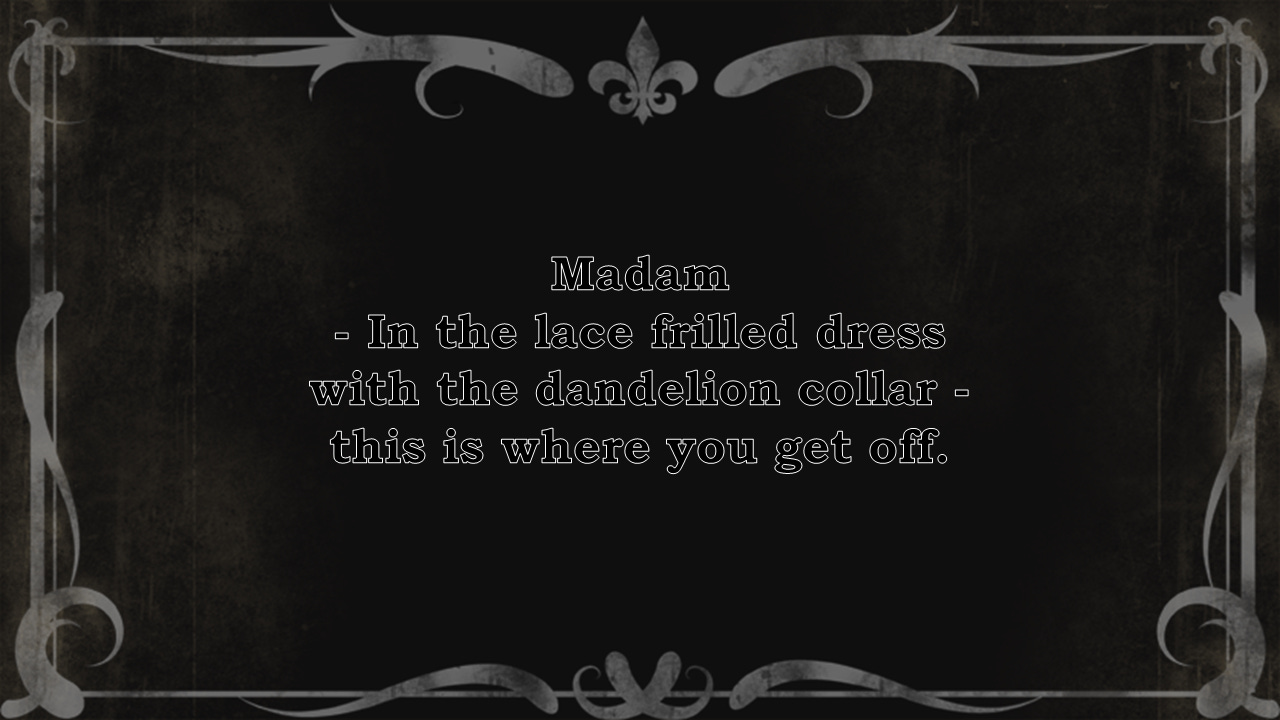
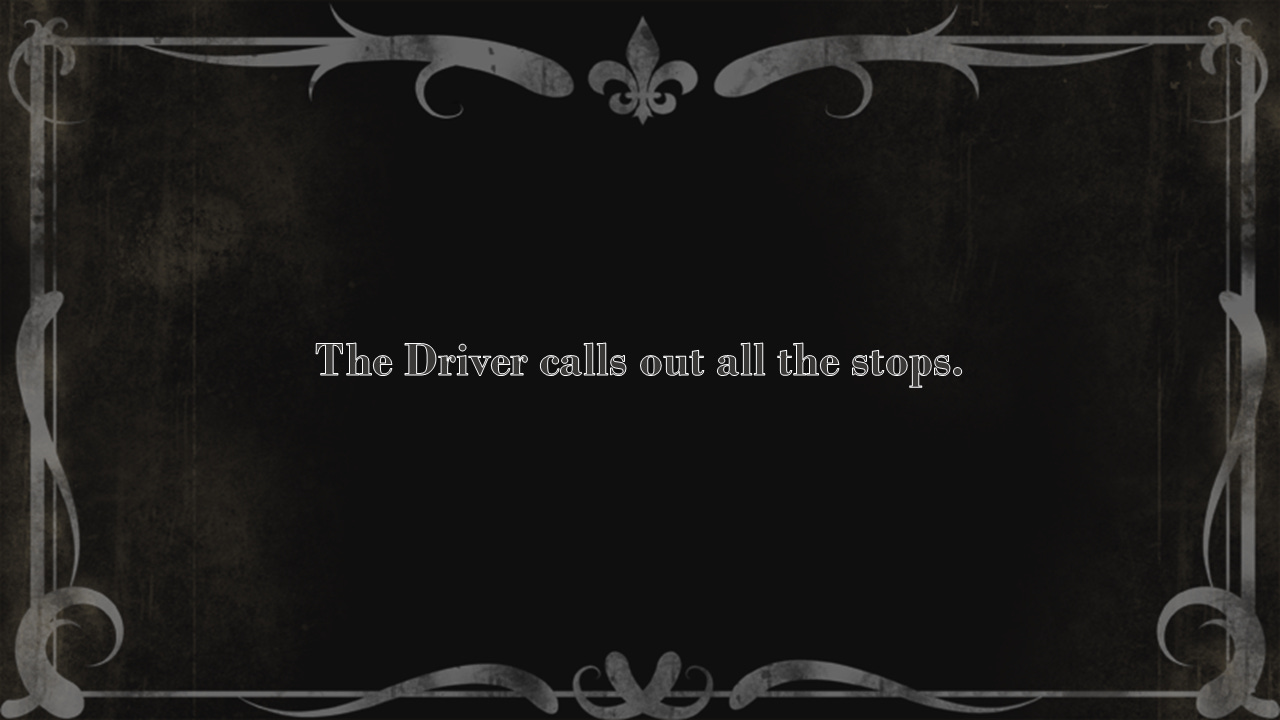
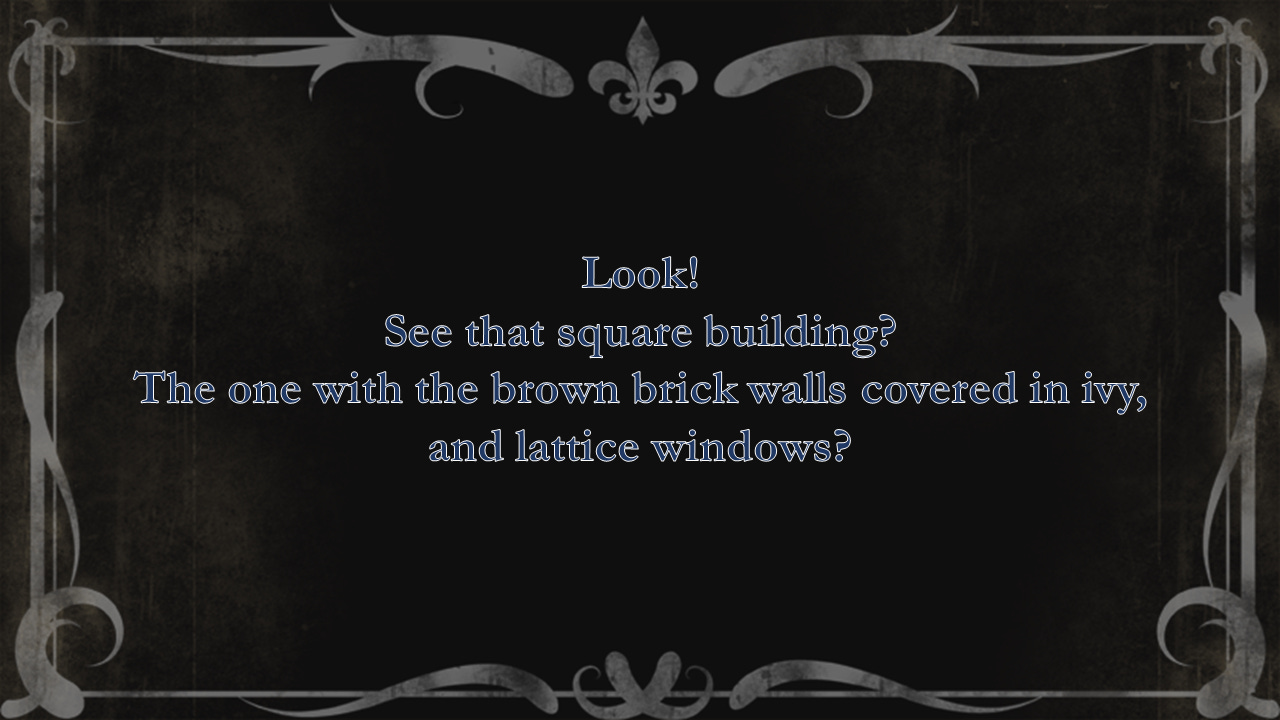
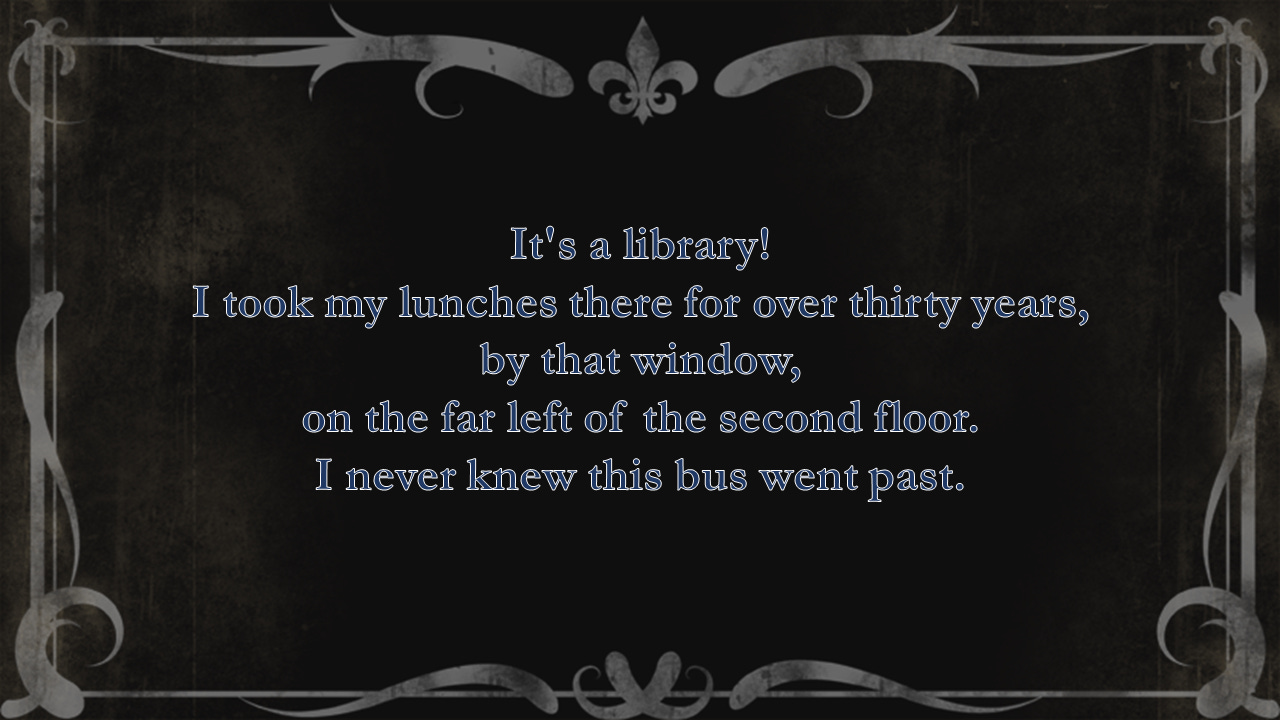
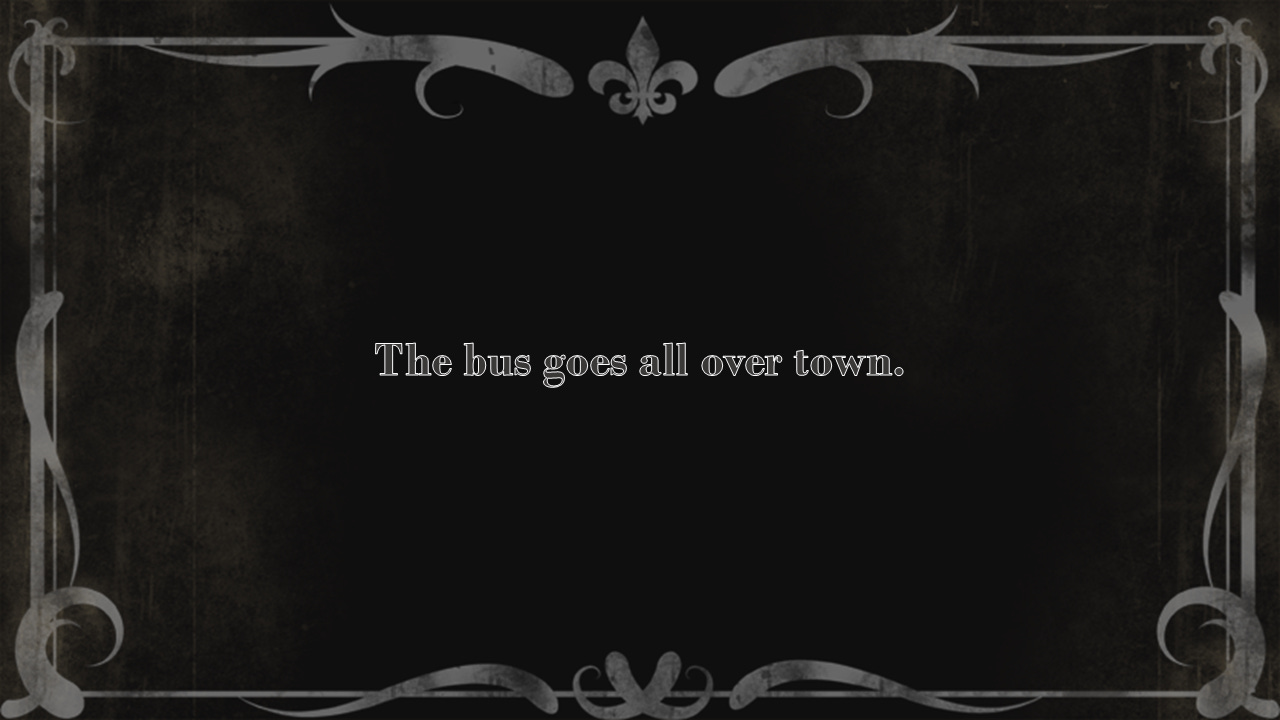
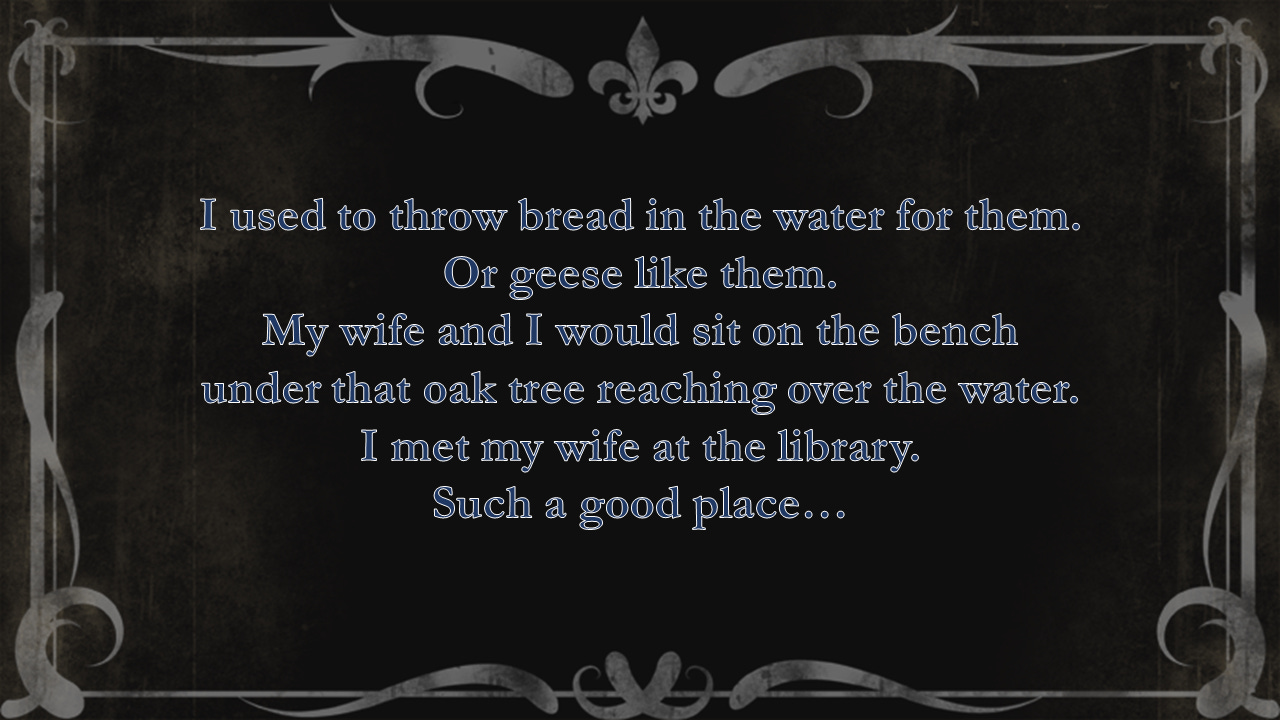
This was the most interesting bus ride I have ever been on. Felt so real, yet distorted, like the ceiling mural...and I don't know if it's my pessimism kicking in, but The Young Man feels suspicious. Should the Old Man have stayed on the bus? I feel anxiety for him!!!